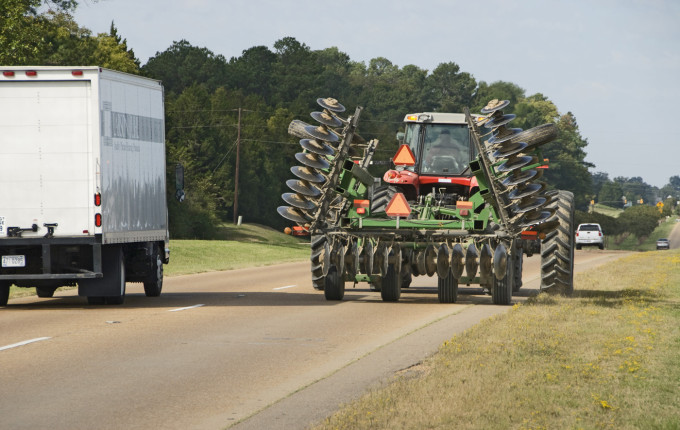We’ve all been there. You’re cruising down one of North Carolina’s many rural highways or secondary roads, perhaps off to vacation at the beach or in the mountains, when all of a sudden you come up on a tractor or some other piece of farm machinery on the road. To many motorists, this is frustrating —a brief slowdown on an otherwise smooth journey. But to farmers, traveling on roads and highways can be a dangerous yet necessary part of the job. And with the arrival of spring and the beginning of the busy season for many of North Carolina’s farmers, you’re a lot more likely to encounter farm equipment on the road.
With nearly 50,000 farms, North Carolina remains a strong agricultural state. This is particularly true in the 80 rural counties in North Carolina, but urban/suburban counties like Wake, Pitt, or Davidson counties still have a heavy agricultural presence. And even though much of the state’s population lives in urban areas, the intermingling of motor vehicles and farm equipment is increasingly common. Whether traveling a mile on highway 264 in the morning or crossing highway 70 in the afternoon, farmers will inevitably have to share the highway with motorists.
About a year ago North Carolina Farm Bureau partnered with the NC Department of Transportation and the NC State Highway Patrol to launch a tractor safety billboard campaign urging motorists to be safe and patient when they encounter a tractor on the road. The message was simple: See a Tractor, Slow Down.

“This campaign is a reminder that our highway system is vital to our way of life. We use our roads for many things, including traveling to work, to play, and to live our lives. The men and women who grow and produce our food depend on these same roads. It is important to our families as well as the farmers and their families to pay special attention around these vehicles. This campaign helps remind us all to share the road with our farmers,” said Kevin Lacy, NCDOT State Traffic Engineer.
Colonel Bill Grey, Commander of the North Carolina State Highway Patrol said, “The Highway Patrol encourages everyone traveling in and near farming communities to stay alert for slow moving farm equipment. Be patient when you come up behind a tractor or other farm machinery and wait to pass until you have a clear view of the road ahead. [In 2014], there were a total of 146 traffic crashes involving farm equipment resulting in one death and 31 injuries. Our ultimate goal is to provide a safe driving environment for all motorists who share North Carolina highways.”
- Between January 2010 and December 2014, there were 976 accidents involving farm machinery with 529 injuries and 21 fatalities.
- Top 10 Counties for Farm Machinery-related crashes: Sampson, Robeson, Wayne, Duplin, Pitt, Johnston, Nash, Wake, Edgecombe, and Wilson
NC Farm Bureau President Larry Wooten added, “We understand that most motorists rarely encounter farm equipment, but when you do it’s important that you drive carefully and patiently. It’s important for farmers and the millions of motorists who travel our roads and highways. As North Carolina continues to grow into rural areas, it is important that we do our part to make the public aware that it is vital to share the road in a careful and responsible manner with our farmers.”
The North Carolina Driver’s Handbook offers some great information and advice on how to drive safely around farm equipment.
- Most of the crashes that involve farm equipment occur on a clear day, during daylight hours, and/or on a dry surface that is paved. Typical crashes with farm equipment include sideswipes and angle crashes.
- These types of crashes typically occur while farm equipment is turning left and another vehicle attempts to pass.
- When sharing the road with farm equipment, you must obey the rules of the road. It is illegal and very dangerous to pass farm equipment in a no passing zone.
- The key to safety when sharing the road with farm equipment is to be patient. If farm equipment is causing a delay in traffic, the operator should move off the road at the nearest practical location and allow the traffic to pass. This is the only advisable time to pass farm equipment on public roads.
- Remember, when approaching farm equipment the closure time is much quicker because of the slow speed of the equipment. Always approach farm equipment with care.
Much of the work farmers do takes place off the beaten path and in the quiet corners of our state’s rural communities. But sometimes farmers have no choice but to use public roads just like other businesses do. Most farmers wouldn’t choose to travel on public roads if they had another option, but they don’t.
So the next time you see a tractor on the road, please slow down and be patient. Our farmers will appreciate it.

